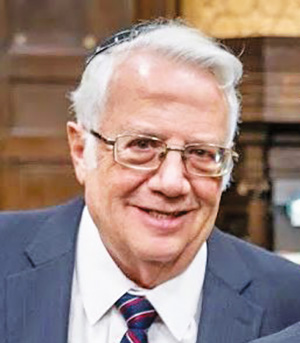
It is not I who should be standing here to be maspid (eulogizing) Henry but my father, the Rov, or my husband, Reb Aharon, whose shiur he attended at the Gruss Center. I do not think that I can, in any way, represent them or eulogize Henry as they would have. I have agreed to speak today as I, too, feel a deep bond to Henry and to his family.
My first association when I think of Henry is Henry at my father’s funeral. I remember saying to my sister, Atarah, a”h, “Look, there is Henry Horwitz.” Henry was in mourning for his Rov, and his demeanor and conduct reflected his feeling of loss. It was as if our family included, as it often did, the talmidim of my father, and Henry was prominent among them.
Henry was one of the talmidim. Yet there was a difference. Henry’s bond was a continuation of a family bond that existed for years before Henry became a talmid. Henry’s grandfather, Samuel Feuerstein, was among the early supporters of Maimonides School, the day school that my father established, in an era when day schools were not very popular among American Jews, who feared that these schools would return the children to the ghetto and that they would not integrate and assimilate into the American scene. Mr. Feuerstein supported the school financially, week after week, for years, despite the opposition in Boston. His support was not only financial but was an expression of both personal commitment to my father and deep identification with their shared values. He could have given his money to the UJA and would have received כבוד מלכים (honor of kings) from the larger Boston community. Instead, he aligned himself with the Rov. Those who did were few and far between.
Henry’s parents were cut of the same cloth. They too sent Henry to Manhattan Day School, which was founded in 1943. They were deeply committed to raising children ברוח ישראל סבא (according to tradition).
Henry’s family and our family were very closely connected. Our shared vision and values were a bond that drew us together and we shared family joys and difficulties.
Henry was a talmid not only of my father, the Rov, but also of Reb Ahron Soloveitchik. If I were to suggest those who could have eulogized Henry, I would have added Reb Ahron to the list. Who didn’t know that Reb Ahron was the posek for Yavneh? Who was deeply involved in Yavneh? Henry. Yavneh, for those who do not know, was a religious student organization for bnei Torah who were studying in universities. Henry was deeply involved in the organization, and he set the tone for many of their activities. He was prominent in enhancing the Torah atmosphere that was the distinguishing feature of the group.
Henry had two distinguishing traits: commitment and loyalty.
Henry was committed to Torah in the fullest meaning of the word. He was איש ההלכה (a man of law). He lived a life of Halacha and he raised his children to be אנשי הלכה (lawful). He had no doubts as to what needed to be done. He never looked for the easy way out. Henry kept קלה כחומרה, [kept Halacha] carefully and in an uncompromising manner.
Loyalty. Henry’s loyalty was unsurpassed. Once a friend of Henry’s, always a friend of Henry’s. He never forgot a friend. The expression “we used to be close friends” did not exist.
Friendship was never in the past tense but in the present tense. Once a friend, always a friend.
He was loyal to his rebbeim. There was a period of time when our family learned Mishnayot on Pesach on my father’s yahrzeit. Henry joined us faithfully every year. After a while, we stopped. Henry was upset and kept calling and saying that this was not right. How could we do such a thing? Henry turned into my nagging conscience. His loyalty to his Rov was sterling.
Henry, you led a life of Torah and יראת שמים (fear of Heaven). You have left a legacy to inspire all who knew you.
תהיה נשמתך צרורה בצרור החיים.
May your soul be bound up in the bond of life.
Dr. Tovah Lichtenstein, PhD, a daughter of Rabbi Dr. Joseph B. Soloveitchik (The Rov), has lived in Israel since 1971 when she made aliyah with her husband, Rabbi Aharon Lichtenstein, of blessed memory, and their family.










